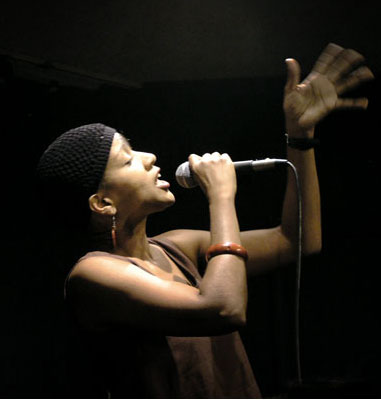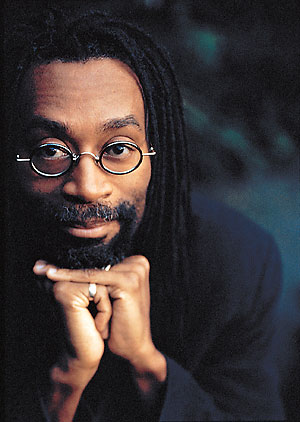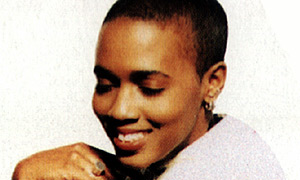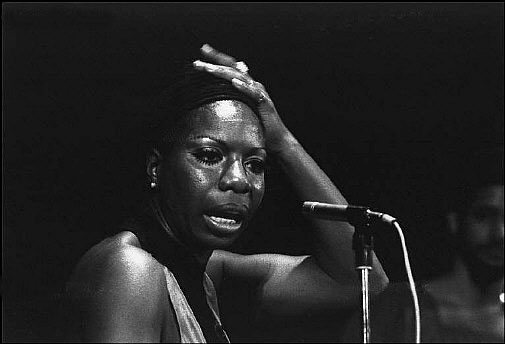RENE MARIE / “Blackbird”
Taking risks, that’s the lesson I’ve learned. When you’re scared to make the next move because you don’t know how it’s going to turn out…Well, you never know how things are going to turn out, even if you play it safe.
—Rene Marie
I wouldn’t consider “Blackbird” a standard yet, but it’s getting there. Since Paul McCartney debuted his composition in 1968 on the Beatles’ White Album, scores of R&B, pop and jazz singers have covered it. Among them are Dionne Farris and Bobby McFerrin, whose versions we are including in this week’s jukebox. But to my ears, one version stands alone.

René Marie’s “Blackbird” is a tour de force, a magnum opus, an astounding piece of musicianship that, for me at least, defines what the art of singing is all about. The strange thing is, it almost didn’t happen. I don’t mean the recording of “Blackbird,” I’m talking about René’s entire career as a vocalist—it almost didn’t happen.
In 1995, René was a 40-year-old Roanoke, Virginia housewife and mother who, as far as she knew, was perfectly content with her lot in life. She’d married her high school sweetheart, her children were growing up just fine and she had a nice home. True, her friends were always telling her she had an incredible voice. True, she’d been a semi-professional singer way back in the Seventies, before her first child. René knew she could sing. What she didn’t know was that she could SING. The turning point, according to interviewer Jim Newsome, came one day in 1996:
[René] didn’t perform again in public until 1996, spurred on by the very child for whom she’d given up her career two decades earlier. Home from college on a break, he called from a local restaurant and said, “Mom, you should start singing again. You gotta come hear this woman, she’s terrible. I’ve heard you sing at home better than this.”
“So,” she remembers, “I went out to the restaurant and we sat at the table listening. I thought, ‘Man, I can’t believe she’s getting paid for this.’”
But, writes Newsome, as René’s singing career began to build momentum, her husband, himself a former musician, began to resent her. “‘The more I sang, the more I came into myself,’ she says, ‘and the more I realized I was being oppressed as a human being in that relationship. It really was an issue of control. Gradually, I realized that this guy just wants to control me.’” Eventually, René’s husband told her she could have either him or the music, but not both. “I packed my bags,” René told Newsome. “[But I] made sure I put the music in the car first. …And I never did go back.”
Fast-forward four years to 2001. René Marie is listening to Robert Hurst and Jeff Haynes lay down bass and percussion, respectively, for what will become the greatest version of “Blackbird” yet recorded, her version. Perhaps René’s thoughts wander to five or 10 or 15 years previous when, if she was singing, it was probably at the kitchen sink or in the laundry room or on break at her day job at the bank. More likely though, her thoughts are focused on only the task at hand. The task? To sing McCartney’s song—her song—as expressively, creatively and majestically as she possibly can.
She sings: “All your life you’ve waited for this moment to be free.” She could be singing about herself, finally free to express herself creatively. “Blackbird fly into the light of new dark night.” She could be singing about you, finally free to do/be whatever it is you wish to do/be. “Blackbird, fly.” She could be singing about me. “Fly!” She could be singing about any of us, all of us.
She uses her entire vocal range, as considerable as it is. Overcome by emotion, she reaches even deeper, reaches even further than she normally does or can. She begins to moan. Growl. Shriek. Wail. Whisper. “Fly!” she urges us. “Fly!” She will not accept excuses. Pain, fear, weakness, handicap: no excuse, none of it. “Take these broken wings,” she demands, “And fly.” She exhorts us: “Fly!” Beseeches us: “Fly!” Entreaties us: “Fly!” Commands us: “FLY!” And maybe it’s only for six minutes and twenty-two seconds, maybe it’s only in my mind, but every time I hear Rene Marie’s version of “Blackbird,” I do just that—I fly.
—Mtume ya Salaam
Quotes from “Rene Marie – Cinderella Sings The Blues” by Jim Newsome. Available at http://www.jimnewsom.com/PFW-ReneMarie.html
Bonus tracks:
Dionne Farris – “Blackbird” (Live) from Passion cd single (Columbia - 1995)
Bobby McFerrin – “Blackbird” from The Voice (Nonesuch - 1990)
Nina Simone – “Blackbird” from Anthology The Colpix Years (Rhino - 1996)
Note: Unlike the others, Nina’s “Blackbird” isn’t a cover of the Beatles’ song and I don’t know which Nina Simone album it’s originally from. I’m including it only because Nina’s been on our minds lately and because it’s pretty.
Writing their asses off
Them Beatles, song writers I tell you—not much as singers but they could write their collective asses off. This song has so many layers, so many ways in and out with meanings to explore probably unknown even to the creators of the song themselves. While I totally agree that Rene Marie is totally outstanding, still must mention and applaud what Bobby McFerrin and Dionne Farris do with the song.

Bobby is easy going down but that’s only because he is a craftsman of the highest order. What he does with his voice sounds effortless, as though he were just playing around, but try it, just try to do like Bobby does and you will know—it ain’t no way as easy as it sound. This is taken from a live solo album that Bobby did. Here is extreme acapella. Naked acapella. And my man does it to death, totally committed to life breath and body sound. You check, of course, when he make the wing flutter sound with his throat. Bobby know he bad.

Dionne Farris on the other hand is mixing funk and rock, thus this version, taken from a CD-single, is a feature for the un-credited electric bass guitar player. And though there is not much singing in terms of how many measures, in the little time she uses, Dionne indicates what she is fully capable of doing. From the opening after she finally comes in and begins repeating herself, improvising a little riff on the word blackbird, to the high notes at the end which she hits unerringly, Dionne Farris is in fine, fine voice. Why Columbia doesn’t just release a live album is beyond me—probably because she is no longer signed to them and they don’t give a damn, or maybe because she was difficult to deal with and they didn’t want to go through the changes necessary to get what they wanted from her (oh, wait a minute, that’s the same thing—they just don’t give a damn).
A while back Dionne released a self-produced album in Atlanta. Have not yet been able to find a copy. It’s out of print and nobody I know has a copy…this is not a hint, this is an outright beg: if you got a copy please let me know. I’m sure we can arrange something.

Now that Nina Simone that Mtume likes, that one is Nina in her roots percussion bag and is the negative (in photo terms) of the positive. Where the Beatles song celebrates future flight, Nina’s song declaims past captivity. It’s a bracing tonic whose bleakness makes you fully appreciate freedom. Mtume called it pretty; that boy got a strange way of looking at life ;->)
—Kalamu ya Salaam
This entry was posted on Sunday, November 20th, 2005 at 12:59 am and is filed under Cover. You can follow any responses to this entry through the RSS 2.0 feed. You can leave a response, or trackback from your own site.
2 Responses to “RENE MARIE / “Blackbird””
November 24th, 2005 at 5:18 pm
Haven’t gotten to the songs in the jukebox yet. I got ten more minutes before I have to pick up Ua (my daughter) and Duwani is still singing, BUT I wanted to say MTUME you are writing your but off this installment. I appreciate the creative, imaginative, personal, and layered spin you put on all these introductions. I have been off BOL for a while and I have no complaints upon my return.
Enjoying it.
Leave a Reply
| top |